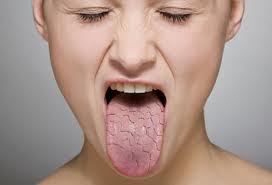 What is Dry Mouth Xerostomia
Dry Mouth Syndrome or Xerostomia is a condition where the mouth becomes very dry, because of not having enough saliva to keep it wet. Xerostomia is a result of reduced saliva flow due to decreased secretion from salivary glands.
A dry mouth is a symptom of an underlying problem, rather than a disease in itself. About 10 per cent of the general population and 25 per cent of older people have dry mouth syndrome.Waking Up with Dry Mouth • When it is a problem?
Waking up with dry mouth is usual, especially among the elderly. But if you have a dry mouth all or most of the time, it is not only uncomfortable due to difficulty in speaking and eating, but it can also lead to more serious health problems due to loss of the protective effects of saliva.
Temporary mouth dryness is not worrying. Most people have experienced the temporary sensation of xerostomia from time to time especially when they are nervous or anxious. Dry mouth becomes a problem when it becomes a chronic condition affecting the patient's normal mouth function.Health risks caused by Xerostomia
Dry Mouth symptoms
The first symptoms of dry mouth usually appear when waking up at night or in the morning. Some common symptoms associated with cases of xerostomia are :
Causes of Dry Mouth - Xerostomia
There are several reasons that might cause a consistent dry mouth problem.
Dry Mouth Remedies and Treatments
Depending on the causes of dry mouth, your health care provider can recommend the appropriate dry mouth treatment. Xerostomia could be caused as a symptom of a number of systemic diseases that you might not be aware of. If you are experiencing any dry mouth symptoms, visit your physician or dentist to determine what is causing the condition and recommend the proper xerostomia remedy.
Natural Dry Mouth Remedies
If there is no permanent organic problem that causes the dry mouth, you could try first the following dry mouth home remedies that can provide a natural cure to the problem:
Over the Counter Dry Mouth Treatments
If the natural dry mouth remedies do not ease the xerostomia symptoms, you could try other treatments including some over the counter products :
Medical Dry Mouth Treatments
If there is a permanent damage of the salivary glands and the causes of dry mouth cannot be eliminated, the above treatments may not help enough. In this case :
Dry Mouth and Tooth Decay
Saliva is important for the protection of your teeth against tooth decay, regulating the mouth's pH value and diluting the acids produced by the dental plaque bacteria. Patients suffering from xerostomia are in greater risk of tooth decay.
In some severe cases of xerostomia, when the patient's teeth are very susceptible to decay, dentists suggest the use of dental sealants in order to prevent tooth decay, along with using dry mouth remedies. Dry mouth can cause extensive tooth decay (even in a person with a healthy mouth for years), and it contributes to many other oral health problems.If you keep waking up with dry mouth or experience xerostomia symptoms too often during the day, take extra care with your daily oral hygiene to reduce the risk of cavities and periodontal disease. Seek the advice of a dentist on dry mouth remedies as soon as persistent dry mouth symptoms appear. | |
Cosmetic, Implant , General Dentist in Smithtown Long Island, NY. This blog has been created to bring up all oral health topics and dental treatment. I welcome any discussions of any dental topics or dental treatments that are important to you. Videos and articles can be found on my website, www.WeCaterToCowards.com. I look forward to helping and using my personal experiences in dentistry in the past 15 years in all aspects of dentistry. Talk to you soon.
Monday, November 3, 2014
Xerostomia/ Dry Mouth
Subscribe to:
Post Comments (Atom)
If you learn that you'll be encountering dried up jaws more than a lengthy timeframe and that it's consequences are generally permanent, there are a number regarding dry mouth remedies accessible to you.
ReplyDelete